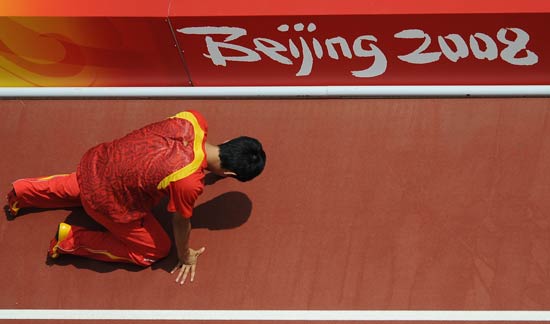As the view of Chinese hurdler Liu Xiang limping off the Olympic track stunned and disappointed the nation on Monday, the reaction of the mega-star's countrymen would have been equally surprising if it were two decades ago.

When Li Ning, a triple Olympic gold medalist in 1984 and the "Gymnastic Prince" in China, stumbled and failed in the 1988 Seoul Olympic Games, he was met with a tide of anger and even hate mail containing razor blades and ropes upon his arrival home.
Lauded as a national hero as Li, Liu received an equally-dramatic response for his withdrawal due to foot injury -- but this time with overwhelming sympathy and support and a climax of rethinking of the nation's obsession with gold medals.
Among more than 160,000 surveyed by the Chinese channel of MSN.com as of Tuesday noon, over 37 percent voted for respect and support for Liu's "quit." About 26 percent "felt the cruelty of sports competition and sighed for Liu," while more than 6 percent said it was hard to accept and still hoped for him to continue the race.
Following the withdrawal news on China's biggest portal website Sina.com, more than 3.6 million online comments were overwhelmed by warm words such as "Liu Xiang, you're still my hero," "we'll always support you" and "Go, Liu Xiang."
In a sign of what his victory would have meant to the country, Chinese Vice President Xi Jinping sent a telegram to the General Administration of Sport on Monday, saying the country's top leaders all understood the Shanghai native's situation and hoped "he will relax and focus on recovery."
Liu's withdrawal was the last thing Chinese wanted to see in the long-expected Olympic Games held on home soil. The 25-year-old won the 110-meter hurdles at the 2004 Athens Olympics, the first Olympic gold medal in such a competition for a country where track and field stars were scarce.
"Liu Xiang looked so painful on TV during the warm-up. He did his best if it was the injury. It broke my heart!" said Cao Fengyi. The anesthetist at a Beijing hospital bought tickets for the women's basketball but had always wanted to witness Liu's race live.
"Liu should have been a major attraction of the Beijing Games, but you can't control injuries," she said. "I sincerely hope he recovers soon."
It wasn't supposed to be like that more than two decades ago. Prior to Li Ning, Zhu Jianhua, the three-time world record holder in the high jump, saw the windows of his home smashed after he returned from the 1984 Los Angeles Olympics with a bronze, not a gold.
"Zhu suffered too much pressure at that time. Who will go to smash the windows of Liu Xiang's home today?" said blogger Wabupaluodi. "The society is progressing and people now are more open-minded. More and more Chinese are taking the attitude of enjoying sports."
"China is far away from the period when it has to prove its national strength with gold medals. Chinese will no longer return to the state of 'east Asia's sick men' just because of the loss of a gold," said blogger Yang Xiaojie. "Liu must be more pained than us."
A similar change could be observed in the attitude of Chinese towards the loss of gold medals in other cases.
Zhu Qinan, the men's 10 meter air rifle champion at Athens, burst into tears on the podium after receiving a silver medal on Aug. 11. Despite disappointment on the loss of a gold, spectators gave him warm applause and a loud cheer. It was a touching scene when the 24-year-old was finally brave enough to wave his bouquet to the audience.
"The confidence of Chinese should not rely on a gold medal but the spirit of struggle," Yang Chang, a DJ with the China National Radio, told Xinhua. "The gold tally can't decide whether a country is strong in sports. We should attach more significance to civil sports development."